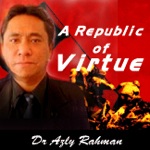The Asri problematique and the rise of denominational Islam?

But in all these and applicable to all religions, the question remains: at what point is innovation in religion allowed, acceptable, and tolerated? At what point is the “denominationalization” of Islam acceptable without the religion being demonized by those who think they have understood the Divine presence but actually clutched by the Devil’s right hand?
A REPUBLIC OF VIRTUE
Azly Rahman
http://azlyrahman-illuminations.blogspot.com/
The current uproar over the arrest of Dr. Asri, former Mufti of Perlis interests me. I am not particularly interested in the political and ideological dimension of it; rather in how this issue will develop in this hypermodern country plagued with internal contradictions. “The center cannot hold” as the Irish poet W.B. Yeats once said, and “Things Fall Apart” as the title of the great African novel of Chinua Achebe suggests – these describe the Malaysian theological dilemma, a dilemma that has a history and a future.
Malaysian Muslims are yet faced with another challenging situation; one which presents an interesting extrapolation of the historical dilemma the Muslims have been facing intellectually. Coming soon would be a public intellectual crisis that involves the Grand and subaltern voices in Islam. Those of the Wahabbi, Salafi, Sunni, Syiah, Sufi, and the “denominations derived from traditional and indigenous practices” (the tariqats primarily) will come out in the open to assert the “truth-ness” of their perspective and practice of Islam.
Essentially now, Islam seems to have many ‘denominations’ based on cultural, geographical, political, economic, and intellectual factors—as a consequence of globalization. Muslims are all part and products of the various authorships of these ‘denominations’ — thanks to the power/knowledge matrix of the evolution of Islam. These denominations are even mutating, depending on class and consciousness of the adherents.
On a crude psychological plane in Malaysia, here is the situation, stated in simple terms:
The subaltern voices in Islam are clashing with each other. Examples abound. The Sufis are saying that the Wahabbis are on the wrong path, the Wahabbis claim they are preaching the one and true tauhid and that Sufism is a strange invention, the Shiahs in Iran are probably building more powerful weapons against the Sunnis the Mid-east over, the Malaysian government is propagating Hadhari and the halal hub in a haram casino-capitalistic environment, the Malays have produced their own messiahs or Rasul Melayu (Malay prophets) and their variants of Ayah Pins and their Sky Kingdoms, the anti-hadiths are roaming cyberspace declaring themselves Quranic-only Muslims, the liberal Muslims are at loggerheads with the strict ones bent on moral policing, the gangsta-rapper-Busta Rhymes-type Muslims are angry with the soft-spoken Raihan-acapella-type- Muslims, the Sisters in Islam are angry with the Malaysian Brotherhood of Islam or the Ikhwanul Muslims, the Death Metallists are having a field day with all these chaos amongst Muslim ideologues, the Catholics are fighting in court over the issue of the “Allah” ban, the whirling dervishes are still whirling…. it is a postmodern situation in the field of Islam in Malaysia. I hope this is a useful sketch of the postmodern Muslim condition.
Are Muslims then better off reading the Quran hermeneutically? Is it better for them to remove themselves from the philological, historical, and most importantly cultural context, take the scripture in whatever meaningful language it has been translated into, and take only the spirit of it, and like a Prometheus unbound, soar to greater theological heights? This is a challenging question.
Or maybe religious sentimentality and critical sensibility must come from one’s own exploration using a triad of sense awareness, intellect, and intuition, drawn from purely cultural sources? — We can then be free from cultural biases and these “geographically and politically- bound” schools of thoughts?
In that case then we will be going into the realm of what I consider “truly spiritual democracy” and use reason and rationality to read the Quran (or any religious text) for that matter. Will the collection of hadiths be necessary anymore? I think this question has been answered by the subaltern Muslims that has already begun their systematic critique of the narratives of the Great Prophet.
There is a growing number of Muslims who are beginning to assert that the highest faculty is human reason, which we must exercise in order for us to be truly human. This is the essence of the Enlightenment and of the Renaissance in that only through reason and feeling that we can arrive at an understanding the meaning of who we are. Some say through lots of zikir, chanting, and even dancing (whirling dervishes included) that one can reach what needs to be reached mystically. The dancer danceth the dance of the dance itself (like what Michael Jackson lived for, maybe), and in his/her dance, as she whirls and twirls, he loses himself into the abyss of nothingness … profound … even looking from the outside.
But in all these and applicable to all religions, the question remains: at what point is innovation in religion allowed, acceptable, and tolerated? At what point is the “denominationalization” of Islam acceptable without the religion being demonized by those who think they have understood the Divine presence but actually clutched by the Devil’s right hand?
We are prisoners of language, trapped in a prison-house of language. We can avoid the answers but we can never run away from more questions. Like in the song Hotel California (by the California rock group Eagles) that goes “you can check out anytime you like but you can never leave”.
Perhaps, in all these lie a possible marriage between philosophy and religion — finally. In Malaysia though, is this at all possible?
While the opinion in the article is mine,
the comments are yours;
present them rationally and ethically.
AND — ABOLISH THE ISA — NOW!

